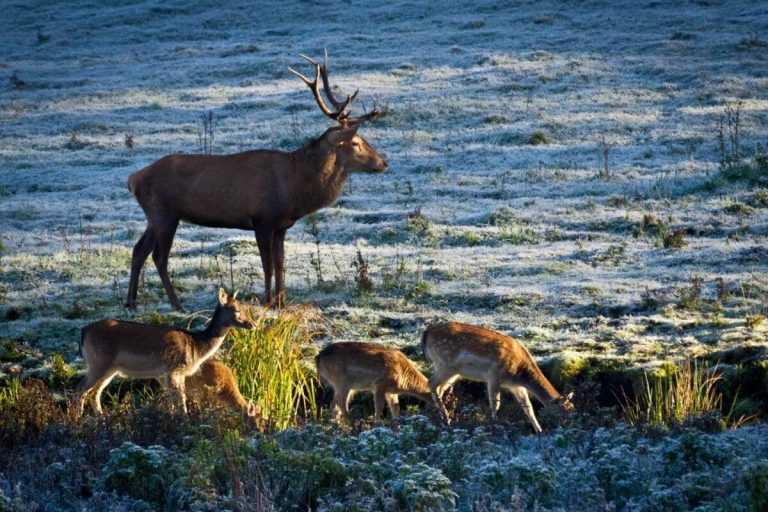High Educational Value
Nationally recognized educational quality at an affordable price.
*Source: ONet Online/U.S. Bureau of Labor Statistics. Unity cannot guarantee employment. Salary data represents averaged earnings for occupations listed and includes workers at all levels of education and experience.

This course covers key ecological concepts and management principles for free-ranging animal populations, including community and population ecology, habitat management, and human dimensions. Topics include game and non-game management, species recovery, and nuisance wildlife, focusing on current issues faced by wildlife managers.

This course considers the human dimensions aspects of wildlife management. Topics include approaches to involvement of interested parties in management, conflict resolution, and decision-making approaches through case studies and human-dimensions research. You will learn principles that are needed to find science-based and socially acceptable solutions to wildlife management problems.

This course teaches essential wildlife research techniques, including field and lab methods. You will focus on data collection, analysis, and interpretation, preparing for research-based careers and further academic pursuits in wildlife ecology and management.

Wildlife Ecology and Management is the science of understanding, managing, and preserving wildlife populations and their natural habitats. This field combines ecological principles with conservation strategies to maintain biodiversity and ecosystem health. As a wildlife conservationist, you study the complex interactions within ecosystems, focusing on how wildlife species interact with each other and their environment. You assess the impacts of human activities on these natural systems and develop plans to mitigate negative effects, ensuring sustainable coexistence between humans and wildlife.
Earning an MPS in Wildlife Ecology and Management is vital for maintaining the balance of our natural world. By studying and protecting wildlife, you contribute to ecosystem stability, climate change mitigation, and food security. This field also emphasizes the ethical responsibility to preserve wildlife for future generations and the intrinsic value of all living beings.
The MS in Wildlife Ecology and Management provides students with an advanced understanding of ecological concepts and essential research skills necessary for wildlife management. Students study the latest scientific advances in wildlife ecology, conservation biology, landscape ecology, and research methodologies. Through interactive coursework, students develop skills in spatial and quantitative analysis, experimental design, data interpretation, conflict-resolution and decision-making, communication, and how to effectively engage with diverse audiences interested in wildlife, ecology conservation, and management.
The program emphasizes mastering research fundamentals, methodologies, and design to prepare graduates for research-based jobs and further graduate education. Graduates are prepared to take on research and leadership roles in state and federal government agencies, conservation organizations, and academic institutes to sustainably manage wildlife and their habitats, both locally and globally.
Your online education should be affordable and manageable. Thanks to our promise to keep tuition flat through 2030, you won’t be burdened with unexpected increases or fees.
Our team of distance education concierges will work with you through the admissions process to help you plan and pay for your degree. Learn more about the costs here.
The timeframe for completion is up to you! Enroll in 6 credits per term and complete the program within just one year. Alternatively, opt for part-time study by taking one course at a time. Whichever path you choose, we’re here to support your educational journey every step of the way. Contact your concierge or advisor to create your personalized plan.
Research Core: 15 credits
Major Program Core: 15 credits
For a better look into your program, view our full course catalog. Then apply online for free to get started.
The Master of Professional Science (MPS) is a graduate degree designed to combine scientific knowledge with practical skills relevant to the workforce. Unlike traditional science degrees, the MPS emphasizes hands-on experience and professional development, preparing students for careers that require both expertise in science and the ability to apply that knowledge in real-world contexts. MPS programs focus on a range of skills that are directly applicable to the workplace:
The MS degree is a traditional graduate program focused on deepening scientific understanding through research and academic study.
The wildlife ecology and management degree requires 30 credits with a minimum 3.0 GPA. View our full course catalog for a better look into your program. Then apply online for free to get started.
Nationally recognized educational quality at an affordable price.
Committed to sustainable practices to prepare for a future of environmental awareness.
Dedicated to turning career and academic aspirations into tangible achievements.
Fast-track your Master’s degree and finish your program in as little as one year.
Connect with experts who share your passion for working in the industry.
Ranked #1 independent university in the U.S. by the Social Mobility Index.
With up to 5 terms a year, you can take a break without jeopardizing financial aid.
Balance life, work, and education by studying when and where you want.